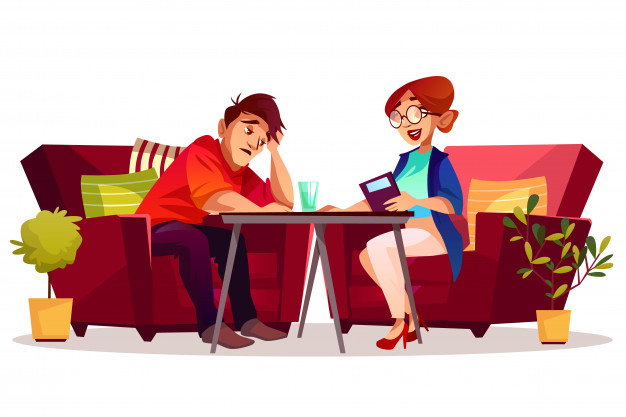Anxiety and depression are two terms that are thrown around in regular conversations but not a lot of people are aware of the difference between the two. Here is a brief discussion about what the disorders are, how they’re interlinked, and possible treatment options.
What is Anxiety?
You must have heard the word “anxiety” or feeling “anxious” quite commonly, that’s because anxiety is your body’s natural response to stress. It’s a feeling of fear or apprehension for what’s to come, like the first day of school, a job interview, a big presentation in the office.
When this feeling of anxiety becomes too extreme and lasts for a longer time, and interferes with your life, then you may have an anxiety disorder.
In the case of natural anxiety, the fear you feel could motivate you to work harder and achieve your goals but with anxiety disorder, the feeling of fear is more intense and never leaves you. This type of severe anxiety may cause you to lose focus on your goals and not enjoy the things you like.
Mental symptoms of anxiety
People with anxiety may:
- Worry about the things to come in future
- Avoid situations that could cause anxiety
- Have uncontrollable thoughts
- Think about extreme negatives like death
Physical symptoms of anxiety
People with anxiety may experience:
- Increased heart rate
- Lack of sleep
- Difficulty in concentrating due to racing thoughts
- Shortness of breath
- Gastrointestinal disorders (nausea, diarrhea, constipation)
What is Depression?
There are days when you might feel sad, unmotivated, angry, etc for no apparent reason, the “feeling blue” is quite normal and happens to everybody but when this feeling lasts for a longer time and interferes with your life, then you may suffer from depression.
Depression can be defined as the feeling of sadness, loss, or anger which interferes with the daily life of a person, and that’s why depression is classified as a mood disorder.
People experience depression in different ways, like for some it might interfere with work-life causing lost time and less productivity, or it could influence the relationship for some, or it might influence some chronic health conditions like diabetes, cancer, obesity, etc.
Depression is considered a serious medical condition and without proper treatment, it could get worse. Those who seek help can see the improvement in symptoms in just a few weeks.
Mental symptoms of depression
People dealing with depression may:
- Be hopeless
- Feel worthless
- Feel like there’s no point in trying
- Feelings of restlessness, irritability, and anxiety
Physical symptoms of depression
Physical symptoms of depression may be:
- Loss of focus and concentration
- Feeling tired, fatigue, headaches
- Loss of appetite
- Sleeping more or less than regular
- Gastrointestinal problems
It’s not necessary that every person dealing with depression will feel the exact same symptoms or have the exact same experience, it could be different for different people, the above mentioned are a few of the very common symptoms.
Is there any connection between the two?
Roughly 50% of people diagnosed with anxiety will also be diagnosed with anxiety disorder, this is because both anxiety and depression share a common biological basis. A persistent state of anxiety disorder or low mood disorder, involve changes in neurotransmitter function. Low serotonin levels, along with chemicals like dopamine and epinephrine, play a role in both the conditions.
While the biological basis is the same, anxiety disorder and depression are experienced differently. It could be seen as the two sides of the same coin. They can occur sequentially, like people with depression might feel “anxious distress”, in addition to their low mood, or both the conditions can co-occur.
What are the treatment procedures?
Even if you feel regular anxiety or low mood and not the disorder, treatments are still worth considering. Analyze how severe is your condition and how much it’s interfering in your life and make a decision accordingly. The following could be treatment procedures:
Self-care
If your symptoms are not severe, self-help can be a reasonable place to start. Some common self-help suggestions are self-help books and apps that adapt to evidence-based psychotherapies, meditate for anger or anxiety, exercise, etc.
Psychotherapy
If your symptoms are more persistent and interfering with your daily life, then seeking formal help is worth considering.
Psychotherapy or talk therapy is a type of mental health treatment and is widely used for anxiety disorder and depression. During psychotherapy sessions, you talk to a doctor or licensed health care professional to identify and treat your condition.
Psychotherapy is of different types, like one-to-one sessions, group sessions, family, couples, etc. Depending on your diagnosis and the best-suited procedure for you, will allow the doctor to decide your treatment procedure.
Medication
A group of medication is identified as helping with anxiety disorder and depression and depending on your diagnosis, the doctor will prescribe you with the medication. Medication could be used with or without psychotherapy.
Mental wellbeing is just as important as physical wellbeing, and there’s no shame in seeking help and giving a voice to what you’ve been dealing with. When seeking help for anxiety or depression or some other mental illness, start by speaking with your primary care physician.


Recent Comments